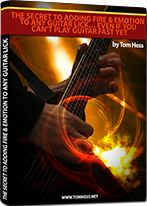Creativity And Expression - Part 2
by Tom Hess
Emotion To Any Guitar Lick

EMAIL TO GET ACCESS
By submitting your info, you agree to send it to Tom Hess Music Corporation who will process and use it according to their privacy policy.
I had originally planned on part 2 of this topic to be totally different from what you will read below, but I received a lot of e-mail after people read "Creativity and Expression - Part 1" regarding the last example I wrote about (the story board concept). Many people wanted a more detailed explanation of how the idea can be applied to their (your) songwriting. So here is an exercise for you to do.
Emotion To Any Guitar Lick

EMAIL TO GET ACCESS
By submitting your info, you agree to send it to Tom Hess Music Corporation who will process and use it according to their privacy policy.
- Choose your topic. Find something that you want to express musically. You can choose anything you want such as: a personal event, feeling, thought etc. from your own life, or a story that you heard about or read about, or you can create a fictional story, event, etc. to use. The key is to know exactly what it is that you are going to be expressing before you begin to even think about writing music. What are the expressive goals? Why have you chosen this topic to express in music?
- Write it down. Once you have chosen your topic, write it down on paper in your own words in a few paragraphs. You will be coming back to this written description of your topic over and over again as you are writing music, so keep this close by you when you are working. Describe (in writing) the events, feelings, thoughts, the people, places or things involved, etc. Remember what your expressive goals are?
-
Divide into sections. Divide story/topic into sections. The number of sections will vary depending on many factors that are all based on your story. For most songs, 3-8 sections are typical but more less are possible. The sections of your story/topic will determine the number of musical sections of your song, so think about this carefully. Number each section.Trending Articles:
 How To Create Emotion On Guitar
How To Create Emotion On Guitar
Learn how to accurately express emotions in your guitar playing.
 Improve Guitar Playing Creativity
Improve Guitar Playing Creativity
Learn the main reasons why you
struggle to be creative on guitar.
 Become An Expressive Songwriter
Become An Expressive Songwriter
Disover how to develop accurate self-expression as a songwriter. - The 7 basic elements of music. Make a list of the 7 basic elements of music. Then think about how each musical element (rhythm, harmony, melody, texture, form, timbre, dynamics,) can best be used to express your expressive goals (your story/topic) into music. Really think about each element, don't just rush through this step. Write down your ideas about each on the same paper that you prepared in step 2.
- Climax. Think about where the climatic points in your topic/story are. Which section is the main climatic point in? At specifically what point in that section is the climax located (beginning, middle, end. etc.) It may be a good idea for you to compose the climatic point first even if it's the middle or end of the story. If you know where you are going, it’s going to be a lot easier for you to get there. In most stories, parts before the climax build up to the climax and parts after the climax generally move away from it. In other words, what happens before the climax usually creates tension and what happens after the climax usually creates resolution of all the built up tension. Of course not all stories or music follow this pattern, but often times it does. Write down your ideas about each on the same paper that you prepared in step 2.
Now that you have all of this down on paper, you are ready to begin writing the actual music for your song/composition. As you are writing the music, go back to your original ideas that you wrote down on paper in steps 2-5. Are you following your original ideas or have you begun to evolve away from them as you are writing the music? It's common for me to sometimes get away from my original intentions once I am composing the music and have been working on the piece for a while. Sometimes the result of changing the plans works out to be even better than the original, but sometimes it is a failure and I go back to the original concepts and rework the music to better fit my intentions. For the purpose of learning this way of writing music, I encourage you to stick with your original plans for now no matter what. After you feel more comfortable with writing/expressing yourself in this way then certainly you can evolve out of this compositional style when it best suits your own needs.
As always, readers are welcome to e-mail me.
Creativity And Expression - Part 1
Develop your guitar playing skills with online lessons for guitarists.

